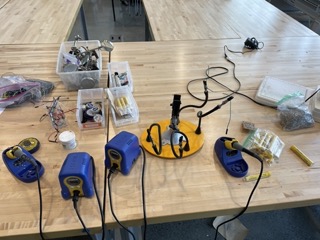Why All Students Should Take An Engineering Course

February 8, 2023
In high school, students take the classes required to graduate, such as math, English, science, and history. With their remaining periods, they can choose electives to take, such as music, theater, or art.
Students can also choose to take engineering with one of their elective periods.
This option is often underappreciated. Many students opt to take art or music because it fulfills the credit requirements, but learning engineering has many advantages that may not be obvious at first glance. Taking engineering teaches students skills that are useful no matter where they go with their career, from architecture to art and mechanics to music. Because of this, all students, even those not planning to go into a STEM field, should consider taking engineering as an elective.
SRHS Senior and a graduate of the SRHS Engineering Program, Andreas Ritter, says, “there are a lot of broadly applicable skills that you can learn.”
The main lessons that come from an engineering course are not how to make a bridge or a model rocket or a remote control car, but instead how to work in a team, plan and budget your time, and fix things or create solutions to problems.
Teamwork is an extremely important skill to have in today’s world. Both in college or a job, collaborating with others is just as important, if not more important, than being good at a specific skill. Teamwork allows students or employees to be more effective and get more done in a group, and colleges and employers know this.
Ritter says, “One of the main things I learned in Physics Academy was how to manage time and work collaboratively with other people.”
Unlike most high school classes, engineering teaches students to work together. Most courses give individual assignments or group projects that reward splitting up the work and working alone. However, engineering projects require students to work together, and reward collaboration in brainstorming and problem solving.
Tegan Mack, an SRHS Junior and engineering student, says, “I think [the projects] are bigger than other classes.” Mack adds, “I think the balance of who does what in the group, when you’re working on a project, that’s something you don’t constantly do in every single class.”
Another skill that is taught by engineering, and is useful in every field, is time management.
Many classes have assignments that are due the next class, or the next week, and can be completed quickly. This teaches students to do their work before a deadline, but doesn’t teach them how to break up a larger assignment that is due weeks after it is assigned.
In engineering, students are given projects that last anywhere from weeks to months, and because the class is “very hands off,” as Mack puts it, it is up to students to budget their time and plan ahead. This is again a useful skill in a job or in college, where there aren’t guide rails to keep you on track, but instead it is up to individuals to keep themselves on schedule and complete their work on time.
As Ritter says, “Organizing projects and delegating tasks effectively would make projects successful.”
Many students often point out that school teaches academic subjects math and english, but not life skills like how to cook or do taxes. Engineering courses however, teach students skills that they can use as adults. Many broken objects or problems can be fixed with the basic tools that students learn about in engineering, such as drills and saws. In addition to tools, students also learn how to use logical problem solving to find solutions, a skill that can be applied all throughout life.
Having problem solving skills and knowledge of basic tools allows students to fix household objects, such as furniture or appliances, instead of paying to have it fixed or buying a new one. This is especially useful when paired with the abundance of information and tutorials available through the internet.
Mack agrees, saying ““It’s good to understand how stuff you experience in your everyday life works.”
Because the skills that the class teaches go far beyond engineering, “it’s something that everyone should at least try,” even if they don’t plan to go into an STEM career, as Ritter says. Mack adds, “it’s also a course that is usually full of pretty fun people.”





































